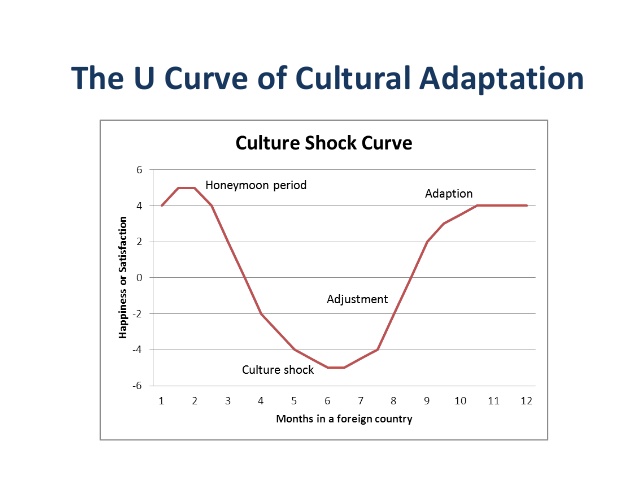mobvet
Adjusting to another culture
In this chapter we focus on some common processes of adjusting to the host country so that you can understand how to manage your stress and emotional reactions in order to make your mobility period happy and exciting.
Many of us have experienced culture shock when starting a new job or traveling. When you start your mobility period in a foreign country, you can encounter many cultural and language differences. People who have been abroad discuss their experiences in terms of stages, presented as the U-curve.

Stage 1: cultural euphoria or „honeymoon periood“.
At the start of your mobility there is an excitement about being in a new culture. Everything is new and wonderful and you are eager to explore it. In this stage you tend to see the culture through rose-colored glasses and your interpretations are rather optimistic. You focus more on visible aspects of culture (food, clothing) and tend to ignore more complex and less visible cultural aspects.
Stage 2: culture shock or cultural confrontation.
In the next stage, the initial excitement you felt when you arrived, diminishes and the process of adjustment begins. This can be characterized by confusion and frustration and is the most difficult stage.
Your feelings can shift from very positive to extremely negative. Everything that you used to do with relative easy in your home country appears much more difficult due to the new culture and language. Homesickness may also contribute to your feelings of discomfort.
https%3A//www.youtube.com/watch%3Fv%3D3iZ-GaEPkog%26feature%3Dyoutu.be%26fbclid%3DIwAR1APkhTb-MC5EqwrMKMO3qFhA4jgUiMHANGxRxNVlcvBqYm9c4bFzUxLJ8#mobvet
Stage 3: cultural adjustment.
This stage represents the transition out of culture shock into cultural adjustment. You feel step by step more comfortable and competent in the host culture. Homesickness may still be an issue for you, but you are interacting more effectively with local people, leading to an increase in self-confidence.
https%3A//www.youtube.com/watch%3Fv%3DB0HMc41XXjU%26feature%3Dyoutu.be%26fbclid%3DIwAR3Hx_0aCco6VqquWXMaF4kI_L5YLhgAVfuXVjgwFTV0R23fSoFMLFh2XIM#mobvet
Stage 4: cultural adaptation.
In this stage, you have reached a confidence to communicate and interact effectively in host culture. You have a deeper understanding of the influence culture has in peoples lives. You have integrated many of the values, customs, and behaviours from the new culture into your daily life.
Summing up with words of one student:
„Any person who has lived in abroad will tell you how the cycle goes. Step one, arrival. Step two – This place is so different! Step three – This place is really just like a home! Step four, formation of confusion: „Now I think I understand this place!“ …
References:
Hofstede, G. (2001). Culture’s consequences: comparing values, behaviors, institutions and organizations across nations. Thousand Oaks: Sage
Maximizing Study Abroad. A Students Guide to Strategis for Language and Cultural Learning and Use (2002). By R.M.Paige, A.D. Cohen, B.Kappler, J.C.Chi, J.P.Lassegard. University of Minnesota.


